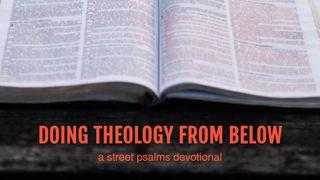An 11-Day Study On Challenges To Biblical AuthoritySample

WHAT DO CHRISTIANS BELIEVE ABOUT THE BIBLE?
WHY STUDY THEOLOGY?
Theology has a public relations problem. Many view theology as a discipline that academics think about locked up in a dusty library cubicle somewhere. The rest of us need to just love Jesus and live life. This is mistaken because theology is about the knowledge of God. We need both.
The words of the prophet Jeremiah come to mind when we think of the importance of theology: “Thus says the Lord: ‘Let not the wise man boast in his wisdom, let not the mighty man boast in his might, let not the rich man boast in his riches, but let him who boasts boast in this, that he understands and knows me, that I am the Lord who practices steadfast love, justice, and righteousness in the earth. For in these things I delight, declares the Lord’” (9:23–24).
Here are five reasons Christians should study theology:
1. To obey the Greatest Commandment. “And you shall love the Lord your God with all your heart and with all your soul and with all your mind and with all your strength” (Mark 12:30). God wants all of us. Part of loving God means loving the truth. We are called to an integrated devotion to the Lord Jesus Christ.
2. To obey the Great Commission. “Go therefore and make disciples of all nations, baptizing them in the name of the Father and of the Son and of the Holy Spirit, teaching them to observe all that I have commanded you” (Matthew 28:19–20). It’s that last part that is so often neglected today. For how can we teach people to obey all that God has commanded unless we know what he has commanded ourselves? Theology is essential for this task.
3. To help us grow in our personal relationship with God. “Therefore, as you received Christ Jesus the Lord, so walk in him, rooted and built up in him and established in the faith, just as you were taught, abounding in thanksgiving” (Colossians 2:6–7). God is personal and we cannot grow in our faith apart from his special communication to us through the Bible.
4. To guard, defend, and impart “the faith.” “Beloved, although I was very eager to write to you about our common salvation, I found it necessary to write appealing to you to contend for the faith that was once for all delivered to the saints” (Jude 3). As we have already seen, there is an apostolic deposit of truth that has already been delivered to us. We are responsible to safeguard the integrity of this New Covenant message. In addition, we can’t guard or defend something we don’t understand. Confidence flows from understanding.
5. To not be deceived by false ideas. “Until we all attain to the unity of the faith and of the knowledge of the Son of God, to mature manhood, to the measure of the stature of the fullness of Christ, so that we may no longer be children, tossed to and fro by the waves and carried about by every wind of doctrine, by human cunning, by craftiness in deceitful schemes” (Ephesians 4:13–14).
Everyone is a theologian because everyone has thoughts about God. The only question that remains then is what kind of theologian we will become. Now that we have set the table, let’s dig in.
GOD’S TWO BOOKS: NATURE AND SCRIPTURE
God’s first book revealing himself is nature. This is often referred to as God’s general revelation because it is available to all people, at all times, and in all places. To “reveal” simply means to unveil or disclose something not already known. This revelation is general in that everyone has access to it. From several New Testament passages we learn that God has revealed himself through what has been made in creation and placed on the human heart:
For what can be known about God is plain to them, because God has shown it to them. For his invisible attributes, namely, his eternal power and divine nature, have been clearly perceived, ever since the creation of the world, in the things that have been made. So they are without excuse. (Romans 1:19–20)
The heavens declare the glory of God, and the sky above proclaims his handiwork. Day to day pours out speech, and night to night reveals knowledge. There is no speech, nor are there words, whose voice is not heard. Their voice goes out through all the earth, and their words to the end of the world. (Psalm 19:1–4)
Indeed, when Gentiles, who do not have the law, do by nature things required by the law, they are a law for themselves, even though they do not have the law. They show that the requirements of the law are written on their hearts, their consciences also bearing witness, and their thoughts sometimes accusing them and at other times even defending them. (Romans 2:14–15)
Scripture
About this Plan

We want to know God and meet Him in His Word. But why is Scripture so confusing at times? In this 11-day Bible reading plan, you'll walk through some of the most challenging aspects in Scripture, find a new confidence in the Bible and a deeper trust in God.
More
We would like to thank Moody Publishers for providing this plan. For more information, please visit: https://www.moodypublishers.com/books/bible-study-and-reference/questioning-the-bible/
Related Plans

Charles Spurgeon on How to Read the Bible

Kingdom Living - The Commands of Christ

Unlimited Service

21 Day Prayer Challenge

Doing Theology From Below

The Other Five Prayer Journey

Read the Book: July - September

The Layoff Test: Trusting God Through a Season of Unemployment

God’s Word, Her Mission: Encouragement for Women Helping Build God’s Kingdom by Wycliffe Bible Translators
